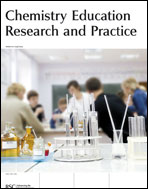Predicting at-risk students in general chemistry: comparing formal thought to a general achievement measure
Abstract
This study is an investigation into the ability of pre-assessment measures of formal thought ability and general achievement to predict students at-risk of poor performance in college- level general chemistry. Over a three year period, data on formal thought ability (as measured by the Test of Logical Thinking, or TOLT) and/or general achievement (as measured by the Scholastic Aptitude Test, or SAT) was collected from over 3000 students as they entered a general chemistry course. The outcome measure was an American Chemical Society general chemistry exam at the end of the course. Findings indicate that both the formal thought and the general achievement measure can successfully identify at-risk students in this setting, with neither measure being superior in doing so. The presence of distinct groups of students correctly predicted to be at-risk by only one of the measures demonstrates that formal thought ability and general achievement each represent an independent hindrance to success in chemistry. Therefore, efforts to help at-risk students should include a focus on the development of formal thought as well as a content review. [Chem. Educ. Res. Pract., 2007, 8 (1), 32-51]

 Please wait while we load your content...
Please wait while we load your content...